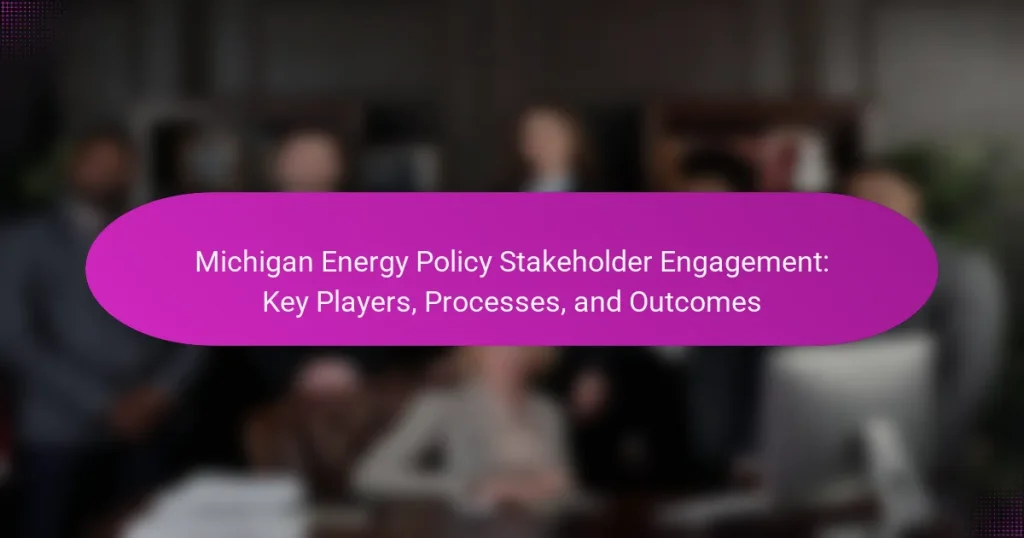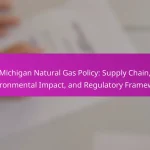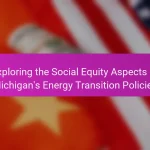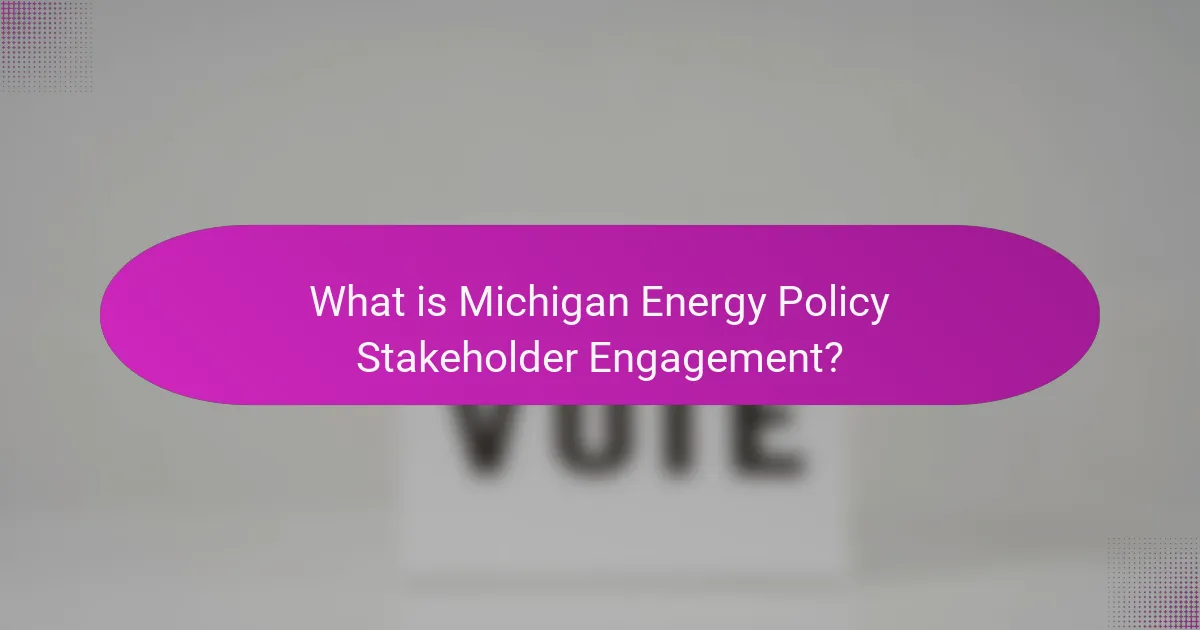
What is Michigan Energy Policy Stakeholder Engagement?
Michigan Energy Policy Stakeholder Engagement refers to the process of involving various stakeholders in the development and implementation of energy policies in Michigan. This engagement includes utilities, government agencies, environmental groups, and the public. The goal is to ensure that diverse perspectives are considered in decision-making. Effective stakeholder engagement can lead to more informed policies that reflect the interests of all parties involved. It often includes public meetings, workshops, and collaborative forums. In Michigan, this process is crucial for addressing energy challenges and promoting sustainable practices.
Who are the key players involved in Michigan Energy Policy Stakeholder Engagement?
The key players involved in Michigan Energy Policy Stakeholder Engagement include state government agencies, utility companies, advocacy groups, and community organizations. The Michigan Public Service Commission (MPSC) plays a crucial role in regulating energy policies. Utility companies like DTE Energy and Consumers Energy are significant stakeholders, as they provide energy services. Advocacy groups such as the Michigan Environmental Council influence policy through public campaigns. Community organizations represent local interests and concerns in energy discussions. These players collaborate to shape energy policy and ensure stakeholder perspectives are considered in decision-making processes.
What roles do government agencies play in stakeholder engagement?
Government agencies play crucial roles in stakeholder engagement by facilitating communication and collaboration. They serve as intermediaries between stakeholders and the government. Agencies provide information on policies, regulations, and initiatives. They also gather feedback from stakeholders to inform decision-making processes. Government agencies organize public meetings and workshops to encourage participation. They ensure transparency by sharing relevant data and outcomes. Additionally, agencies may develop partnerships with stakeholders to foster trust and cooperation. This engagement helps align energy policies with community needs and expectations in Michigan.
How do utilities contribute to the stakeholder engagement process?
Utilities contribute to the stakeholder engagement process by facilitating communication and collaboration among various stakeholders. They provide essential information about energy policies, programs, and services. This transparency helps stakeholders understand the implications of energy decisions. Utilities often host public meetings and workshops to gather input and feedback. They also engage in partnerships with community organizations to enhance outreach efforts. Additionally, utilities may conduct surveys to assess stakeholder preferences and concerns. This direct engagement fosters trust and accountability. Research shows that effective utility engagement leads to better policy outcomes and increased stakeholder satisfaction.
What is the involvement of non-profit organizations in this engagement?
Non-profit organizations play a crucial role in Michigan’s energy policy stakeholder engagement. They advocate for sustainable practices and represent community interests. These organizations often facilitate public discussions and provide educational resources. They also collaborate with governmental bodies to influence policy decisions. Their involvement ensures that diverse perspectives are considered in energy planning. For instance, organizations like the Michigan Environmental Council engage in dialogues about renewable energy initiatives. Their efforts contribute to shaping policies that prioritize environmental sustainability and social equity.
What processes are utilized in Michigan Energy Policy Stakeholder Engagement?
Michigan Energy Policy Stakeholder Engagement utilizes several processes. These include public meetings, workshops, and advisory committees. Stakeholders such as utility companies, government agencies, and community organizations participate actively. The Michigan Public Service Commission often facilitates these engagements. Surveys and feedback mechanisms are also employed to gather stakeholder input. This approach ensures diverse perspectives are considered in policy development. Regular updates and reports are shared to maintain transparency. These processes aim to foster collaboration and informed decision-making in energy policy.
How are stakeholders identified and invited to participate?
Stakeholders are identified through a systematic process that includes mapping relevant entities. This process often involves analyzing the energy sector landscape in Michigan. Key stakeholders may include government agencies, utility companies, community organizations, and environmental groups.
Once identified, stakeholders are invited to participate via formal outreach methods. These methods can include emails, public announcements, and invitations to meetings or workshops. Engaging stakeholders early in the process fosters collaboration and ensures diverse perspectives are included.
Research shows that inclusive stakeholder engagement enhances policy effectiveness and community acceptance. For instance, the Michigan Public Service Commission emphasizes the importance of stakeholder involvement in energy planning processes.
What methods are used to facilitate stakeholder discussions?
Facilitating stakeholder discussions involves several methods. Common methods include workshops, focus groups, and public forums. Workshops allow stakeholders to collaborate on specific topics. Focus groups provide in-depth discussions among selected participants. Public forums enable broader community engagement. Surveys and questionnaires gather stakeholder feedback efficiently. Online platforms facilitate remote discussions and information sharing. These methods enhance communication and ensure diverse perspectives are considered. Research indicates that inclusive engagement leads to better policy outcomes. For example, the Michigan Energy Policy emphasizes the importance of stakeholder input in decision-making processes.
How is feedback collected and integrated into policy decisions?
Feedback is collected through public consultations, surveys, and stakeholder meetings. These methods allow diverse voices to contribute to policy discussions. Feedback is then analyzed to identify common themes and concerns. This analysis informs policymakers about public priorities and preferences. Integration occurs when policymakers incorporate feedback into draft policies. Stakeholder input is often reflected in the final policy documents. This process enhances transparency and accountability in decision-making. Research shows that stakeholder engagement leads to more effective energy policies.
What outcomes result from effective stakeholder engagement?
Effective stakeholder engagement leads to improved decision-making and enhanced project outcomes. Engaged stakeholders provide valuable insights and diverse perspectives. This collaboration fosters trust and transparency among parties involved. It also increases stakeholder buy-in and commitment to initiatives. Additionally, effective engagement can identify potential risks early in the process. Research indicates that projects with strong stakeholder involvement are 20% more likely to succeed. Overall, effective stakeholder engagement contributes to more sustainable and accepted energy policies.
How does stakeholder engagement influence energy policy outcomes?
Stakeholder engagement significantly influences energy policy outcomes by incorporating diverse perspectives into decision-making. Engaged stakeholders contribute valuable insights that reflect community needs and concerns. This process helps to build consensus and fosters trust among participants. Research shows that inclusive engagement leads to more effective policies that are better received by the public. For example, studies indicate that states with robust stakeholder engagement processes see higher rates of implementation success. Additionally, stakeholder feedback can identify potential issues early, allowing for proactive adjustments to policy proposals. Overall, effective stakeholder engagement creates policies that are more equitable and sustainable.
What are the measurable impacts of stakeholder engagement on energy initiatives?
Stakeholder engagement significantly enhances the effectiveness of energy initiatives. Engaged stakeholders provide diverse perspectives that improve decision-making. This involvement leads to increased public support for energy projects. Research shows that stakeholder engagement can reduce project delays by up to 30%. It also fosters collaboration, resulting in innovative solutions for energy challenges. Enhanced transparency from stakeholder input builds trust in energy policies. Additionally, measurable outcomes include improved regulatory compliance and increased funding opportunities. Overall, effective stakeholder engagement directly correlates with the success and sustainability of energy initiatives.
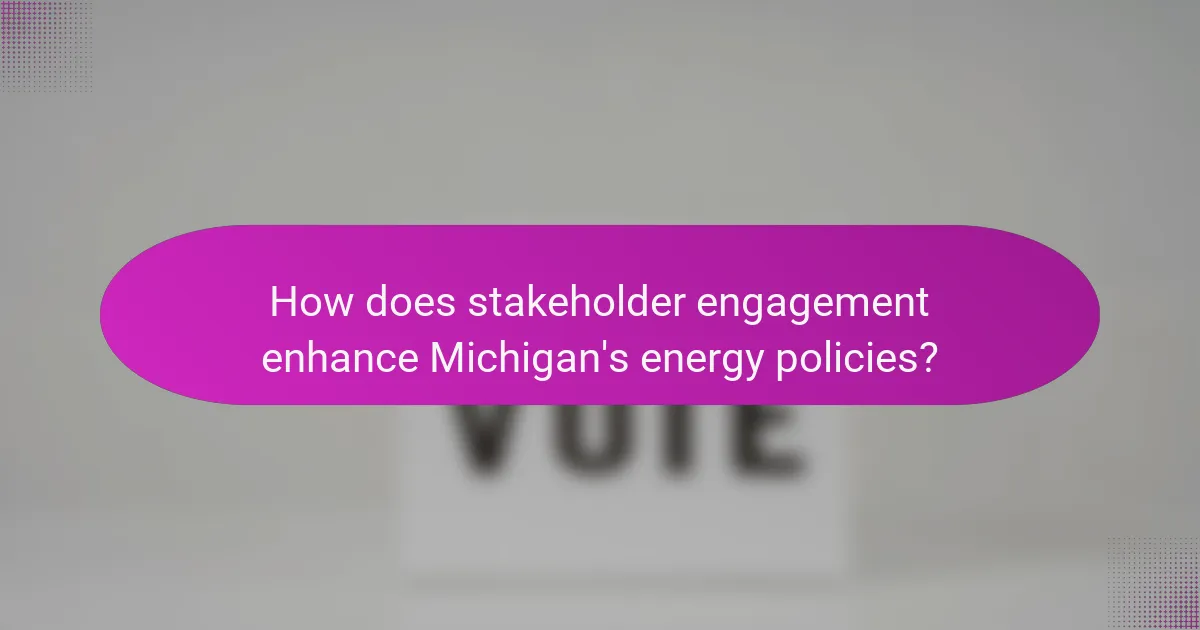
How does stakeholder engagement enhance Michigan’s energy policies?
Stakeholder engagement enhances Michigan’s energy policies by incorporating diverse perspectives into the decision-making process. This collaboration helps identify community needs and preferences. Engaged stakeholders, including residents and businesses, provide valuable insights. These insights can lead to more effective and equitable energy solutions. For example, stakeholder feedback has shaped renewable energy initiatives in Michigan. Such initiatives often result in policies that align with public interests. Ultimately, this engagement fosters transparency and accountability in policy development.
What are the challenges faced in stakeholder engagement?
Stakeholder engagement in Michigan’s energy policy faces several challenges. Diverse stakeholder interests often lead to conflicting priorities. This can create communication barriers among parties involved. Limited resources can hinder effective engagement efforts. Additionally, stakeholders may lack awareness or understanding of energy policies. Time constraints can impede thorough discussions and decision-making. Lastly, regulatory complexities can complicate stakeholder participation. These challenges can ultimately affect the outcomes of stakeholder engagement processes.
How do differing stakeholder interests complicate the engagement process?
Differing stakeholder interests complicate the engagement process by creating conflicting priorities. Stakeholders include government agencies, utility companies, and community groups. Each group has unique goals and concerns. For instance, utility companies may prioritize profit, while community groups focus on environmental sustainability. These divergent interests can lead to misunderstandings and mistrust. Conflicting agendas often result in lengthy negotiations and delays. Research shows that when interests are not aligned, decision-making becomes more complex. This complexity can hinder effective collaboration and compromise. Ultimately, the engagement process suffers when stakeholder interests are not adequately addressed.
What strategies can be employed to overcome these challenges?
Engaging stakeholders effectively is crucial to overcoming challenges in Michigan’s energy policy. Strategies include fostering transparent communication among stakeholders. Regularly scheduled meetings can enhance collaboration and address concerns. Utilizing digital platforms can facilitate broader participation and feedback. Training programs can empower stakeholders with knowledge about energy policies. Establishing clear goals and timelines can align efforts and expectations. Creating a feedback loop encourages continuous improvement and adaptation. Evidence shows that inclusive engagement leads to more sustainable energy solutions. For instance, the Michigan Public Service Commission reports increased stakeholder satisfaction when diverse voices are included in decision-making processes.
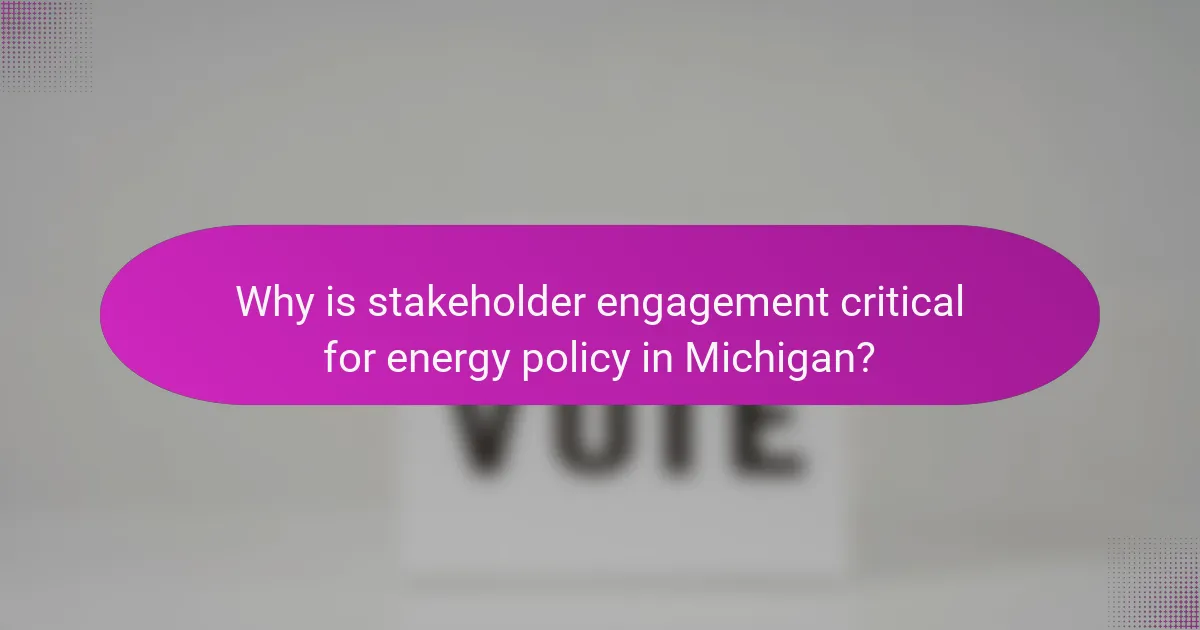
Why is stakeholder engagement critical for energy policy in Michigan?
Stakeholder engagement is critical for energy policy in Michigan because it ensures diverse perspectives are considered. Engaging stakeholders helps identify community needs and priorities. This process fosters transparency and builds trust among the public and policymakers. In Michigan, energy policies impact various sectors, including residential, commercial, and industrial. Effective engagement can lead to more equitable and sustainable energy solutions. For example, the Michigan Public Service Commission emphasizes stakeholder input in decision-making processes. This approach can improve policy outcomes and enhance public support for energy initiatives.
What benefits does stakeholder engagement provide to the community?
Stakeholder engagement provides several benefits to the community. It fosters collaboration among diverse groups, leading to more inclusive decision-making. Engaged stakeholders often share valuable insights that reflect community needs and priorities. This can result in policies that are more effective and widely accepted. Additionally, stakeholder engagement builds trust between the community and policymakers. A study by the International Association for Public Participation found that inclusive processes enhance community satisfaction and investment in outcomes. Overall, stakeholder engagement strengthens community ties and promotes sustainable development.
How does it foster transparency and trust among stakeholders?
Michigan Energy Policy Stakeholder Engagement fosters transparency and trust among stakeholders by facilitating open communication and inclusive participation. Stakeholders are encouraged to share their views and concerns during the engagement process. This approach ensures that diverse perspectives are considered in decision-making. Regular updates and accessible information strengthen stakeholder confidence in the process. Transparency is enhanced through publicly available meeting notes and reports. Engaging stakeholders in dialogue builds relationships based on mutual respect. Trust is further established by demonstrating responsiveness to stakeholder feedback. Research indicates that inclusive engagement leads to higher satisfaction and trust levels among participants.
What role does it play in promoting sustainable energy practices?
Stakeholder engagement plays a crucial role in promoting sustainable energy practices in Michigan. It facilitates collaboration among diverse groups, including government agencies, businesses, and community organizations. This collaboration fosters the sharing of knowledge and resources. Engaged stakeholders can identify local energy needs and preferences. They also help to shape policies that support renewable energy initiatives. In Michigan, stakeholder input has led to the development of programs that incentivize energy efficiency and renewable energy projects. These initiatives contribute to reducing greenhouse gas emissions and enhancing energy security. Evidence from the Michigan Public Service Commission shows that stakeholder engagement has improved the effectiveness of energy policies.
What best practices can be adopted for effective stakeholder engagement?
Effective stakeholder engagement requires clear communication, active listening, and inclusive participation. Establishing transparent communication channels fosters trust and keeps stakeholders informed. Regularly scheduled meetings ensure ongoing dialogue and address concerns promptly. Utilizing surveys and feedback mechanisms allows stakeholders to voice their opinions and influence decision-making. Providing relevant information in accessible formats enhances understanding among diverse stakeholders. Building relationships through networking events encourages collaboration and partnership. Training facilitators in conflict resolution can help manage disagreements constructively. Documenting stakeholder input and outcomes demonstrates accountability and commitment to engagement. These practices are supported by research showing that effective engagement leads to better policy outcomes and greater stakeholder satisfaction.
How can stakeholders be effectively informed and educated about energy policies?
Stakeholders can be effectively informed and educated about energy policies through targeted communication strategies. These strategies include regular informational sessions, workshops, and webinars that focus on policy changes and implications. Utilizing clear and accessible language enhances understanding among diverse stakeholder groups. Providing comprehensive materials, such as fact sheets and reports, allows stakeholders to review information at their own pace. Engaging stakeholders in interactive discussions fosters a collaborative environment for feedback and questions. Leveraging digital platforms for updates ensures timely access to relevant information. Incorporating case studies and real-world examples illustrates the impact of policies on stakeholders. Continuous evaluation of educational efforts helps refine approaches for future engagement.
What tools and resources are available to facilitate better engagement?
Tools and resources available to facilitate better engagement include online platforms, community forums, and educational workshops. Online platforms such as social media and dedicated websites allow for real-time interaction and information sharing. Community forums provide a space for stakeholders to discuss concerns and ideas. Educational workshops equip participants with knowledge about energy policies and engagement strategies. These resources enhance communication and collaboration among stakeholders. Studies show that effective engagement can lead to more informed decision-making and increased stakeholder satisfaction.
Michigan Energy Policy Stakeholder Engagement is the collaborative process involving utilities, government agencies, environmental groups, and the public in shaping energy policies in Michigan. This article outlines the key players, including the Michigan Public Service Commission, utility companies, and non-profit organizations, and their roles in facilitating effective engagement. It details the processes utilized, such as public meetings and workshops, to gather diverse stakeholder input, and highlights the challenges faced in aligning differing interests. Additionally, the article discusses the measurable impacts of stakeholder engagement on energy initiatives, emphasizing its importance in promoting transparency, trust, and sustainable practices in policy development.
